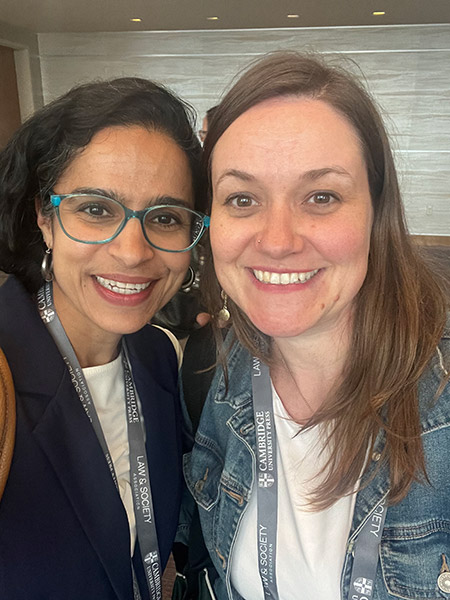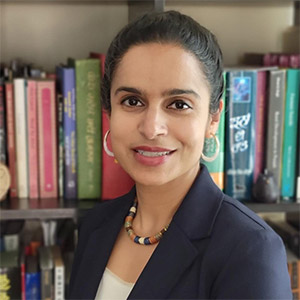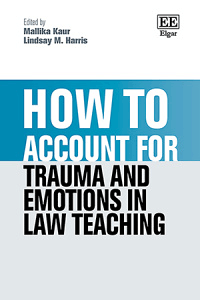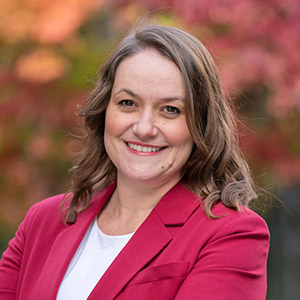By Gwyneth K. Shaw

Mallika Kaur ’10 and Lindsay Harris ’09 met as Berkeley Law students and, both then and in the years since, staked their careers in some of the profession’s most difficult corners. A new book they co-edited explores how experiences handling their emotions have influenced their teaching — and, with the help of academics and practitioners across the country, they argue for a new paradigm based on it.
Kaur has worked with victim-survivors of gendered violence for two decades as an attorney, expert witness, and researcher. She now directs Berkeley Law’s Domestic Violence Field Placement Program and created and regularly teaches the Negotiating Trauma, Emotions & the Practice of Law course.
Harris, a professor at the University of San Francisco School of Law and the director of its International Human Rights Clinic, has spent years as an advocate and teacher in the asylum law area. Like Kaur, as she explored the boundaries of clinical pedagogy she began to examine the emotional toll of lawyering in difficult spaces. Harris has particularly focused on secondary trauma and burnout among lawyers and law students.
Their book, How to Account for Trauma and Emotions in Law Teaching, uniquely weaves together theoretical and practical reflections by diverse scholars on helping law students and lawyers to be zealous advocates without compromising their emotional compass. A more inclusive profession, they argue, needs strategies for engaging — and even encouraging — emotion. Moving forward, they advocate for a holistic, trauma-centered teaching model, and the book draws on the wisdom of faculty and practitioners across the profession, including Berkeley Law Professor Andrew Bradt.
Below, Kaur and Harris discuss why they decided to write the book and how their own experiences as students, practitioners, and teachers influenced it.
Q: How did you get involved in this area of teaching and learning?
Kaur: As a human rights advocate focused on gendered violence work, just over nine years ago I began employing the term “negotiating trauma” to encourage especially lawyers but also practitioners in a range of professions to consider, recognize, and better prioritize the many emotional interplays in our everyday work. In this context, “trauma” refers to an overwhelming emotional experience that is accompanied by an actual or perceived lack of control. We are constantly negotiating the often unspoken and unseen emotions of several players, not just the often imagined “traumatized vulnerable client.” The client is so much more than their trauma, and the lawyer is so much more than their degree and professional training.

In 2016, I was teaching at Berkeley Law while also working with advocates for trauma survivors every day, and a missing piece became more and more obvious. I proposed a new course after talking with students at the law school, alumni who were fellow lawyers out in the world, and with colleagues who teach the next generation of lawyers. The due diligence phase was instructive: Folks had so much to say about what was often left unsaid not just in our classrooms but also in boardrooms and courtrooms.
In 2019 we first offered Negotiating Trauma, Emotions, and the Practice of Law and have taught this course every spring since. I teach this course because it gives feathers to my hope for the future, in which we will sorely need even more strong, reflexive, healthy advocates.
I often receive requests from student groups and faculty — colleagues at Berkeley Law and beyond — to run trainings on this topic as well. As this work inside and outside the classroom grew, I wanted more folks in the legal profession to hear what I was hearing. So I began publishing interviews with attorneys on this topic to further make it stick that “negotiating trauma” is not an add-on to our jobs, but quite central to doing them ethically yet zealously.
It’s so fulfilling when I hear from former students that they have picked up certain thought-processes that help strengthen their confidence around sustaining themselves in their chosen legal work.
Harris: I went to law school to work with forced migrants and in a career focused on human rights and refugee law. It didn’t take long to realize that the emotional realities of lawyering were very real. As I entered into clinical teaching more than a decade ago, I was very conscious of the need to train students to not only think like lawyers, but to also navigate the emotional realities of being a lawyer and the incredible weight, responsibility, and opportunity that entails.
As an asylum attorney, professor, and scholar during the Trump era, in particular, I saw so many immigration attorneys struggling with secondary trauma and burnout. I designed a national study to document that phenomenon and became intensely interested in the “so what?” — what do we do about this? How do we prepare law students and lawyers for the work that we are privileged to do alongside communities in struggle? How do we acknowledge secondary trauma while also cultivating hope and vicarious resilience?
Q: Why did you decide to write this book? Who is your ideal audience?
Kaur: The logic of the book, especially when the publisher first made the contact in another wave of Covid deaths across the world, was very simple: to help address the contradiction of living in a world that is hurting and working in a profession that traditionally has been all about hiding and subsuming hurt in order to appear gladiator-like, warrior-like.
 Many normalizations and rationalizations of various systems, including law schools across the U.S., have been in sharp focus for being out-of-sync with what learners and workers of the present world need. Today, most law students are no longer willing to accept that their legal education must suppress emotions, including trauma responses. In classrooms where professors may be less comfortable with emotional discussions, they may find themselves challenged and perhaps even obstructed from teaching their subject matter with the freedom and expertise it deserves. Is this simply a more stressful time to teach and learn, or can we find ways to channel these stresses and discomfort towards growth? Are there law professors already doing that? We set out with these questions, compiling so many powerful yet empathetic and reflexive voices in this book.
Many normalizations and rationalizations of various systems, including law schools across the U.S., have been in sharp focus for being out-of-sync with what learners and workers of the present world need. Today, most law students are no longer willing to accept that their legal education must suppress emotions, including trauma responses. In classrooms where professors may be less comfortable with emotional discussions, they may find themselves challenged and perhaps even obstructed from teaching their subject matter with the freedom and expertise it deserves. Is this simply a more stressful time to teach and learn, or can we find ways to channel these stresses and discomfort towards growth? Are there law professors already doing that? We set out with these questions, compiling so many powerful yet empathetic and reflexive voices in this book.
We often tell our law students that they need to find people to support them if they want to carry out the often emotionally taxing work of lawyering. These ideal mentors forgo traditionally imagined too-strong-for-emotion lawyerly responses and allow room for acknowledging vulnerabilities and natural reactions to the work. They do not reproduce harm on the easiest available target (a legal secretary or subordinate or even client or fellow student) and do not indulge in puffery to the point of pain. They never suggest that you should get out of the kitchen if you cannot take the heat. Instead, they provide a sense of thoughtful reflexive communities supporting both creativity and rigor. This book hopes to do the same for legal teachers.
Q: Both of you are Berkeley Law alums. How did your student experience shape you as teachers and scholars?
Kaur: My Berkeley Law experience was powerful in many ways, including meeting my fantastic and thoughtful co-editor of this book, and so many other mod-mates and classmates coming from diverse backgrounds across a spectrum of privilege vis-à-vis U.S. law.
Some of the lessons I learned were difficult: Stress expresses itself in a range of ways, including in our bodies; the cumulative toll of lawyering often goes unchecked even among those supervising our field placements and externships; and it is not enough for us to welcome those of various diverse backgrounds and say they belong. Yet, many lawyers, current and future, dependent on our institutions, negotiate belonging and unbelonging every day.
We must recognize that they don’t necessarily want that tension “solved” for them either. I personally drew strength, intellectual and emotional, from those who extended basic kindness, provided options, extended listening that did not seek to assimilate, but hoped to self-empower us to build on our diverse strengths. Later, I would realize that these are cornerstones of trauma-centered work.
What immediately comes to mind is the professor, Richard Buxbaum ’53, whom I trepidatiously went to see about a grade on a paper and was welcomed with “So I think you should publish this fascinating work.” (I did, and he’s read most of my published work in the two decades since.)
Or Angela Harris, the co-author of Chapter 1 of this book, who agreed to sign off on an independent study on a topic entirely apart from her research agenda and who constantly blew me away with her direct substantive feedback as well as steadfast humility.
Professors like this built us up. But we also lifted each other up — and I remind students today of that all the time. I was injured in law school and did not bring a laptop to class for most of 1L and all of 2L year. Yet I was never without meticulously typed class notes. I didn’t go through the Disabled Students’ Program at that time, but I benefited so much from the kindness of friends and classmates who put competitiveness aside. I especially remember Michaela Lozano’s detailed notes and later course outlines got me through those difficult semesters.
In all my classes today, at some point, I ask students to identify the “kindest behaviors exhibited to them in law school.” After some pauses, great answers follow. We all are part of the culture of change we seek to create. Sharing vulnerabilities as well as sharing strengths is a great reset for the mind and body, before it returns to the rigors of legal learning, unlearning, re-learning that I hope Berkeley Law continues to provide space for, especially in these times.

Harris: Berkeley Law is where we met and connected, as first-year law students in the same “mod.” I was struck back then by Mallika’s thoughtfulness, curiosity, bravery, poise, and grace. Without Berkeley Law, we certainly wouldn’t have collaborated in this way and when we reconnected more than a decade after graduating it was our mutual respect and trust we had cultivated as law students invested in social justice and human rights that served as the solid foundation for our partnership and working relationship.
In terms of scholarship, I had a fantastic mentor at Berkeley Law in Professor Kate Jastram ’87, with whom I took Refugee Law, Global Migration Issues, and International Humanitarian Law. Professor Jastram supported my writing and ideas as a law student, pushing and supporting me so that I had two law review pieces in the works by the time I graduated. Through her own scholarship and her support of mine, Professor Jastram helped me to see the value of writing and that getting down thoughts on paper could be a useful way to sharpen my thinking and engage in advocacy.
Q: The book draws from academics and practitioners around the country. What are some of the highlights of the contributors’ chapters?
Kaur: While “wellness” advice for lawyers, and maybe all people, often focuses on finding health and meaning outside the professional day job, I’ve sought out those who have found wonder at the resilience of the human spirit within their work and have tried to better their profession rather than become fatalistic about its unhealthiness. I think each of the contributors has found wonder in the work they do in their classroom.
The chapters are not arranged in the two traditional buckets of doctrinal classes versus clinical classes. We believe there is a lot of room for cross-learning and a severe need to break this binary. Students experience law school as a whole, and professors in neither setting should be assumed to be more or less competent in handling trauma and emotions. Silos are inconsistent with trauma-centered and emotionally intelligent teaching and learning.
From the Civil Procedure chapter (by our resident expert, Berkeley Law Professor Andrew Bradt) to the chapters involving Bankruptcy, Torts, Internal Human Rights, Domestic Violence, Negotiations, and a range of intersectional topics, these authors have been able to provide actionable ideas while also nudging transformation of legal pedagogy.
Harris: There are so many chapters we could highlight but I think some of the ones that have stuck with me are the chapters where the authors are truly introspective and reflective about their own journeys. In doing so, these professors are modeling what we think our students and lawyers need to be doing: Acknowledging, confronting, unpacking, and sometimes wrestling with the emotions that inevitably arise in the study and practice of law.
Q: The legal profession, and legal academia in particular, isn’t known for emotional consideration. Why do you think it’s important to talk openly about the subjects in the book?
Kaur: Exploring trauma-centered practice is relatively new for the legal profession, even though the struggles of engaging trauma are as old as the profession. And in 2024, with more societal interest in mental health tolls — which are frightening especially in our profession, by all surveys on addition, attrition, even self-harm — it is also not enough to follow what Lindsay and I term a “trauma-lite” approach: hastily relegating anything involving human emotion to a “mental health referral.”
This too reflects a dated vision of lawyering that is generally alienating for the human displaying the emotion and also ignorant to the reality of legal practice for most attorneys. So how can we better prepare students for the practice of law, that naturally involves emotions, without scaring them or pathologizing them or then encouraging them to denigrate everything but the cerebral? I think this book answers that, in many different contexts, by many different experts.
Finally, since I run our Domestic Violence Law programs at the law school, and teach on power and control and what the law can and should do to intervene on abusive controlling tactics, I also have to say that like all forms of power, attorney power can sometimes be wielded harmfully or abusively against those they work for and/or with them. To prevent that, we have to talk about how we understand our own power, its limits, its emotional toll, and how our unaddressed hurt might also hurt others.
Harris: As Mallika said, law schools typically don’t do a fantastic job preparing students for the everyday emotional realities of practicing law. We need to debunk the myth that lawyers are somehow stoic individuals who fly in with some kind of superhero cape to save the day and don’t come with a whole host of emotions, backgrounds, and messiness that we bring to the table, just like everyone else.
In training law students to work alongside marginalized communities and, frankly, any clients, we emphasize time and time again that lawyers are human beings, relating to other human beings. Embracing and engaging with emotions and trauma is something we all need to do in order to do that successfully. For me, too, I think it’s very important that law students who do identify as survivors of trauma have models for folks who work within the legal profession and identify in the same or similar ways and who can openly share their own experiences, both harnessing the strengths that come with being a survivor and some of the challenges inherent in that status.